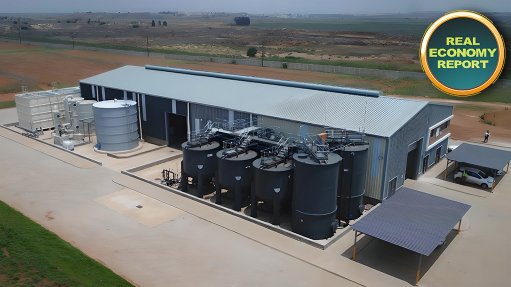SA innovation offers high-tech solution to energy crisis: smart geyser devices integrated into household solar systems could significantly decrease residential load on Eskom, with potential to reduce household electricity bills by 80%
This article has been supplied by the author and has not been written or solicited by Creamer Media. It may be available only for a limited time on this website.
By Mark Allewell, Founder & CEO of Sensor Networks
Electricity Minister Kgosientsho Ramokgopa recently revealed that South Africa is haemorrhaging close to R1 billion daily due to load shedding, with power station performance for the past eight months now sitting at 54% of installed capacity. This announcement bears solemn news to citizens as we enter the summer season, with many hoping for some reprieve from loadshedding during the warmer months of the year. While this will clearly not be possible in 2023, there is some hope for the future: If our government can support the latest in South African innovation and technology by deploying the use of smart geyser devices across South Africa.
Much has been written about the strategic edge to energy conservation in our country, and smart geyser devices offer a significant turning point in our efforts to maximise energy efficiency in our businesses and homes. Until recently, there was little data available to confirm just how strategic smart geyser devices could be in our fight against our national energy crisis. Thankfully, a recent case study has made it very clear: If we can integrate smart geyser devices with our household solar systems, we could unlock up to 80% savings on our monthly electricity bills.
This is relevant today because traditionally, the high energy consumption of geysers made them incompatible with solar solutions, requiring a separate, expensive, solar geyser system (usually starting at a hefty R30,000 per solar geyser system). However, advanced smart geyser devices produced locally in Cape Town can now effectively detect surplus energy generated by solar technology, and direct it towards energy efficient water heating, storing this excess solar energy in the geyser.
This smart technology solution offers South African households and businesses an opportunity to reduce their reliance on conventional electricity and secure significant cost-savings, while encouraging the transition to renewable, more sustainable forms of energy. Smart geyser devices could play a leading role in simplifying our approach to the adoption of solar energy, marking a transformative milestone in our country’s energy landscape.
SA innovation leads the way
Smart geyser devices are a revolutionary solution for integrating geysers with solar power in South Africa. These devices go beyond traditional water heaters, serving as intelligent energy managers equipped with advanced sensors and controls. They efficiently allocate surplus solar energy to water heating without compromising the energy availability for any other appliances. Their energy efficiency is evident through intelligent scheduling of water heating during peak solar energy production, reducing grid reliance towards enhanced energy optimisation, with cost savings and a number of obvious environmental benefits.
The data speaks to savings & sustainability
Based on the data provided by a recent 12-month case study, one is able to confirm that smart geyser devices could help South African households save up to 80% on their household electricity bill monthly. The data provided by this year-long study indicates that smart geyser devices could effectively lower the demand on our national grid, especially during the sunniest 6 months of the year (September to March). A smart geyser device is able to do so by remotely switching geysers on and off at peak sun times.
This innovative approach offers a strategic opportunity for energy conservation in South Africa, as businesses and homes continue to make the transition to solar at record-breaking levels. Over R12 billion in solar panel imports were recorded from January to August 2023, outperforming all solar import figures in previous years. In a country where the supply and generation of electricity is regularly disrupted by power cuts, the widespread use of smart geyser devices with solar technology could play an indelible role in our collective pursuit to save electricity.
The large-scale roll-out of these smart geyser devices, during the summer months ahead of us, could decrease the rate of power cuts in our country significantly. Even if installed without solar power, smart geyser devices can be used to lower the set point temperature of any geyser (which usually rests at around 60°C). Decreasing the set-point temperature using smart-geyser devices can help reduce the energy usage of every household or business precinct.
Based on the data provided by another study of 6,809 smart geyser devices across South Africa in the last year, one is able to confirm that the average energy usage for 6,346 geysers with a set-point temperature of 51 to 70°C is 0.492 kWh. The sample size of geysers with a modified set-point temperature of 50°C included 463 geysers, with an average geyser energy usage of 0.357 kWh.
This clearly illustrates a significant degree of savings (0.135 kWh) on geyser energy usage if smart geyser devices are used to reduce their set-point temperature. If we apply those savings to more than 7 million electric geysers already in use across the country, we could secure total energy savings of around 945,000 kWh – roughly equivalent to one stage of load shedding (1,000 MWh).
A direct pathway to improve energy efficiency in SA
Both case studies prove that smart geyser devices offer a direct pathway to improve South Africa’s energy efficiency, without any of the usual compromise. As a country, we must remain at the forefront of our battle against ongoing blackouts, by supporting the development of innovative tech-based solutions to maximise energy conservation efforts in our country.
Comments
Press Office
Announcements
What's On
Subscribe to improve your user experience...
Option 1 (equivalent of R125 a month):
Receive a weekly copy of Creamer Media's Engineering News & Mining Weekly magazine
(print copy for those in South Africa and e-magazine for those outside of South Africa)
Receive daily email newsletters
Access to full search results
Access archive of magazine back copies
Access to Projects in Progress
Access to ONE Research Report of your choice in PDF format
Option 2 (equivalent of R375 a month):
All benefits from Option 1
PLUS
Access to Creamer Media's Research Channel Africa for ALL Research Reports, in PDF format, on various industrial and mining sectors
including Electricity; Water; Energy Transition; Hydrogen; Roads, Rail and Ports; Coal; Gold; Platinum; Battery Metals; etc.
Already a subscriber?
Forgotten your password?
Receive weekly copy of Creamer Media's Engineering News & Mining Weekly magazine (print copy for those in South Africa and e-magazine for those outside of South Africa)
➕
Recieve daily email newsletters
➕
Access to full search results
➕
Access archive of magazine back copies
➕
Access to Projects in Progress
➕
Access to ONE Research Report of your choice in PDF format
RESEARCH CHANNEL AFRICA
R4500 (equivalent of R375 a month)
SUBSCRIBEAll benefits from Option 1
➕
Access to Creamer Media's Research Channel Africa for ALL Research Reports on various industrial and mining sectors, in PDF format, including on:
Electricity
➕
Water
➕
Energy Transition
➕
Hydrogen
➕
Roads, Rail and Ports
➕
Coal
➕
Gold
➕
Platinum
➕
Battery Metals
➕
etc.
Receive all benefits from Option 1 or Option 2 delivered to numerous people at your company
➕
Multiple User names and Passwords for simultaneous log-ins
➕
Intranet integration access to all in your organisation


















